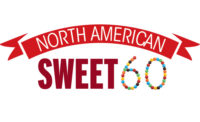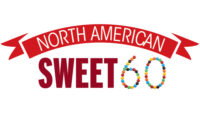Confectioners in the 2022 North American Sweet 60 are regaining life after COVID shutdowns, pushing through supply chain issues and a reduced workforce, and generating innovative ways to be successful.
Mondelēz International has pursued an aggressive acquisition strategy, acquiring California-based Clif Bar & Co. for $2.9 billion. This sale will provide the Chicago conglomerate an additional $1 billion in confectionery sales each year. Mondelēz is already the second largest confectioner in North America with candy, chocolate and gum sales now around $13.063 billion without Clif Bar.
Mondelēz announced in April it will be acquiring Productos Ricolino, Mexico’s leading confectionery, from Grupo Bimbo, for $1.3 billion. The Oreo-maker already closed on its acquisition of Chipita S.A., of Athens, Greece, in January. Productos Ricolino has around $540 in annual sales, while Chipita has around $580 million in sales. Next year, Mondelēz could topple $14 billion in confectionery sales, approaching Mars Wrigley in first place.
Yet even though business is getting better, companies like PIM Brands Inc., of Park Ridge, N.J., still cannot find enough employees — so they have improvised.
“Labor shortages have resulted in an acceleration of our conversion to automation and robotics in our manufacturing and distribution facilities,” says CEO Michael Rosenberg.
When asked if those jobs will ever come back, he speculates that they will not. “I do think those jobs will forever be lost to technology,” he says. “For instance, every McDonald's at one time had counter service with five or six people taking orders and cash, they now have only one person and multiple automated kiosks doing the same work. Bottom line is that robotics are no longer a ‘nice to have.’ They are a ‘must have’ in order to remain competitive, ensure that worker shortages are not a roadblock into the future, and to drive significant increases in output and efficiency.”
Sunrise Confections, a division of Mount Franklin Foods in El Paso, Texas, had to change the way it does business as well, says company spokesperson Dawn Sykora.
“Since consumer demand for candy has continued to increase throughout the past two years it has become more important to stay in tune with both our customers and our suppliers,” Sykora says. “Supply shortages, increased lead times and the overall market inflation has definitely impacted the way we do business.”
To combat those difficulties, Sunrise Confections has had to be more proactive in its planning, she notes, which included bringing in more automation.
Being resourceful is key, according to Rocky Mountain Chocolate Factory, of Durango, Colo.
“As difficult as the pandemic has been, out of necessity Rocky Mountain Chocolate Factory is now a more resourceful and innovative organization,” adds Tracy Wojcik. “It provided the tremendous gift of connecting on a deeper level with employees and franchisees alike. Our mission has long been, ‘We make chocolate fun, and we care.’ Now it includes, ‘Collaboration drives success’.”
RMCF was recognized as No. 1 in the Chocolate and Candy Store category of “America’s Best Retailers” created by Newsweek and Statista. See’s Candies, of San Francisco, Calif., was ranked No. 2.
RMCF will open five new franchise stores in its first fiscal 2023 quarter, Wojcik says, and its new CEO, Rob Sarlls, is planning to visit 50 of their stores over the course of 50 weeks.
Several companies have managed to grow through the last couple of years, including Sarris Candies, of Canonsburg, Pa.
“We were lucky enough to be a supplier to grocery stores and essential businesses, so we continued to be in full production (through the pandemic),” says President and CEO Bill Sarris.
The company, which supplies candy to more than 800 retail locations, is building a fourth plant, set for completion in September 2023. Sarris hopes business will expand into the West Virginia, Virginia, Maryland, and Ohio areas.
Online retailer 1-800-FLOWERS.COM Inc. continues to grow at a rapid pace, with its Celebrations Passport loyalty program, according to company spokesperson Kathleen Waugh.
“With more than a million members, this program is helping us drive increased purchase frequency, retention and the lifetime value of our customers. It is one of the key drivers of strong growth in our best performing customer cohort of multi-category, multi-brand customers.”
California’s Sconza Chocolates has completed a “significant” capital project, according to company President and CEO Ron Sconza. One of North America’s largest pan operators, Sconza has added a chocolate drop molding machine capable of making plain chocolate lentil products. These chocolate drop molding pieces, or candy-coated buttons, are made from chocolate, compound and nut butters, according to Sconza.
“Business continues to be incredibly strong,” Sconza adds. Although he didn’t offer specific numbers, he says business was up in 2021 by over 20 percent. Year-on-year results so far for 2022 are higher than 2021. “Our company continues to drive super impressive results,” he says.
And some believe the worst is over.
“For us, the pandemic is a thing of the past,” says Craig Leva, president of Arway Confections/Long Grove Confectionery. He notes that his company managed through pandemic “OK,” remaining open with COVID protocols in place.
And even though Leva says sales were off a bit in 2020, the Chicago company saw a “significant increase” in 2021 and the increase continues into 2022. Company sales are now at $50 million, up $10 million from the last two years. “Biggest challenges relate to labor, inflationary pressures and supply chain,” he says.
U.S.-based Ferrero North America and Ferrara, both owned by Ferrero Group, also have seen increases. Ferrara is growing 8 percent year over year, according to a company spokesperson. She cited IRI data for the latest 4 weeks ending June 19, where Ferrara is the No. 1 manufacturer for the categories of total non-chocolate and everyday non-chocolate.
Likewise, she says Ferrero North America also experienced growth across the portfolio.
“Ferrero is the fastest growing confections company in North America, thanks to incremental growth and innovative new products,” the spokesperson says. “We continue to invest for growth in North America, with new and expanding facilities across the country – including our recent announcement in Bloomington, Ill., to produce Kinder Bueno products for the first time.”
Ten of Ferrero’s brands saw double digit growth in the past year, she notes. In December 2021, Tic Tac officially became mint category share leader of the mint category.
As for innovation, Ferrero notes it launched Bake with Butterfinger and now works with different influencers and creators to engage at-home bakers through recipes and inspiration.
Yet with all these successes, there also has been severe frustrations. Companies such as Just Born Quality Confections, of Bethlehem, Pa., continually strive to conquer shipping issues.
“We are blessed to have brands that resonate with the consumer,” says spokesperson Matthew Pye. “Like other companies, we are focused on producing and keeping in stock our best-selling SKUs. Having both of our plants in the U.S. has sheltered us from the shipping issues experienced by others who make some or all of their product outside the U.S. This environment has forced us to become better planners based on longer lead times and to have back up suppliers on packaging and ingredients ready if needed.”
Companies such as R. M. Palmer Candy Co., of West Reading, Pa., saw large price increases on packaging and ingredients, long lead times for raw materials, as well as issues with trucking costs and factory labor. “All of these issues every manufacturer is experiencing,” says Dave Abramson, vice president of sales.
Creating new products creates new sales. The company started selling Jelly Belly candies for Easter, Jelly Belly jellybeans inside a hollow foiled bunny, the National Lampoon Christmas Vacation bar, and chocolate-moulded Sponge Bob Characters.
Although its sales are not high enough to make the list, it is noteworthy to mention Sweet Shop Candies, of Mt. Pleasant, Texas, which pivoted from candy production to make facial shields to help the nationwide shortage. The company now strives to get U.S.-made supplies.
“Once chocolate sales rebounded, we worked diligently to find domestic suppliers of all previously imported items to support the U.S. economy and strengthen our supply chain,” says President Michael Moss.
Other success stories include Enstrom Candies, of Grand Junction, Colo. Known for its toffee, Enstrom started a second company in 2019, Hybrid Confections, LLC, which makes private-label nutraceutical gummies using vitamins, minerals and other nutrients for some national retailers, says co-owner Jim Simons. This business has taken off with large accounts, helping to increase sales another $5 million to $30 million annually.
Hawaiian Host, of Honolulu, was able to increase sales 30 percent over last year to $120 million. The Hawaiian company launched a new product, the Flavors of Aloha Chocolate Bar collection, and a new brand, KOHO. According to Stijn Spaas, director of corporate brand strategy, the company got over the pandemic by investing in its team, with new hires from various CPG companies; and creating new products, like the KOHO bonbons and Mauna Loa ice cream; and reinvigorating its online presence.
Pearson Candy Co., of St. Paul, Minn., which specializes in co-manufacturing for private label products, expanded its portfolio by launching bite-size clusters for Nut Goodie and BUN, as well as the Cinnamon Churro and Spicy Salted Nut Roll.
“While supply chain challenges and increased pricing pressures across the supply chain continues, business has been strong and growing for Pearson’s candy,” says Andrea Porfidio, senior director of marketing.
In other news, Just Born is in the process of seeking a CEO, since Ross Born retired at the end of 2021. He was the grandson of founder Sam Born. The founder’s nephew, David Shaffer, is still the current chairperson, while David Yale is the company president and COO.
Ferrero has also appointed Alanna Cotton as its new president and chief business officer for its U.S., Canadian and Caribbean businesses. She will take over Sept. 1 when Todd Siwak steps down.
Additionally, John Melin, of Brown & Haley, of Tacoma, Wa., was promoted to CEO after Pierson Clair retired in March. Melin has been serving the company for over a decade as president and COO.
Furthermore, The Topps Co. sold its sports and entertainment divisions to Fanatics and put its confectionery and gift card divisions under the name, The Bazooka Companies Inc. Now, Bazooka Candy Brands, which used to be a division of The Topps Co., is a division of The Bazooka Companies Inc., still located in N.Y.
“During the pandemic, our e-commerce business has grown significantly based on the strength of our brands and products and evolving consumer purchasing behavior,” says President Tony Jacobs, noting sales are close to $300 million. “Business has performed very well throughout the pandemic as consumers continue to look for treats no matter what the economic, and/or geo-political situation.”




